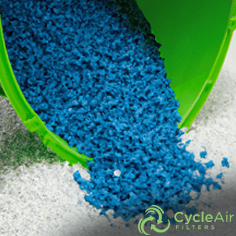
How is Plastic Made, and Exploring Recycled Alternatives
| Scott C
Plastic is an essential material in our everyday lives, found in everything from food packaging to medical equipment. However, the process of creating virgin plastic also contributes to pollution at every stage. In this blog post, we will take a closer look at how virgin plastic is made and the pollution it creates, and why using recycled plastic is a better alternative.
The process of creating virgin plastic begins with the extraction of fossil fuels such as oil and natural gas. These resources are extracted from the earth through drilling, which can cause pollution and damage to the environment. After extraction, the fossil fuels are transported to a refinery where they are processed into raw materials such as ethylene and propylene, the building blocks of plastic. This refining process also produces harmful emissions and waste.
Next, these raw materials are transported to a chemical plant where they are chemically transformed into plastic pellets through a process called polymerization. This process requires high heat and pressure, and generates more pollution through emissions and waste.
Once the pellets are created, they are transported to a manufacturing facility where they are used to create a wide variety of plastic products. However, at every stage of the process, there is a potential for pollution through spills, leaks, and improper disposal of waste.
In contrast, recycling plastic involves collecting and processing used plastic products, which eliminates the need for extracting fossil fuels and reduces the pollution caused by the creation of virgin plastic. Recycling also conserves finite resources and reduces the amount of plastic waste in the environment. Additionally, recycling plastic can also lower costs for manufacturers and has economic benefits.
Better yet, ditch single-use plastics wherever possible and turn to reusable options. Check out our previous article on ideas where to cut out single-use plastics.
In conclusion, while plastic (though not environmentally friendly to product) is an essential material in our lives, the process of creating virgin plastic contributes to pollution at every stage, from extraction to manufacturing. An alternative to virgin plastic is recycled plastic, which conserves fossil fuel resources, reduces pollution and waste, and has economic benefits. As consumers, we can also play our part by choosing products made from recycled plastic and support recycling efforts. By doing so, we can help reduce the environmental impact of plastic and conserve natural resources for future generations.

Leave a comment
Your email address will not be published.